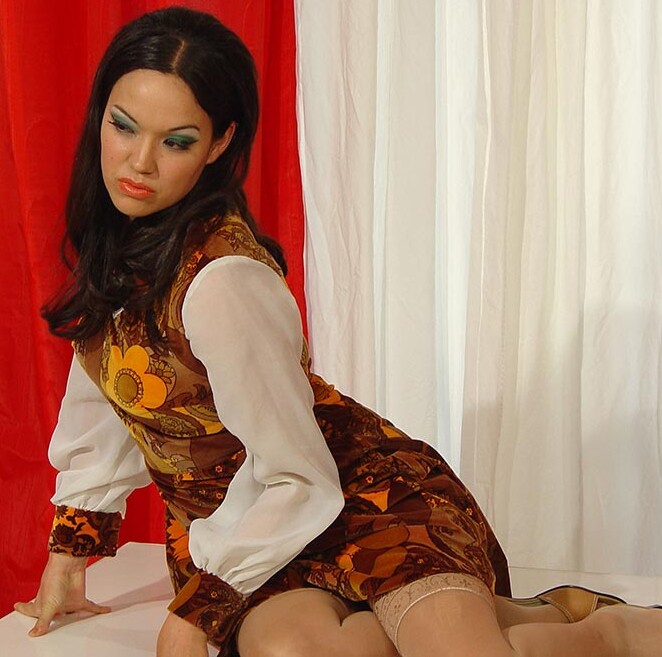Anna Biller in Viva For the New York Review of Books, Namwali Serpell reflects on her visit this spring to Princeton’s exhibit on Nobel laureate Toni Morrison, who died in 2019. “An exhibit of archival materials is about as close to putting an author in a museum as you can get,” Serpell writes. “It sits somewhere between, say, a tour of the writer’s home—which feels akin to celebrity worship—and an exploration of the writer’s words, which feels like the scholar’s remit. . . . The question that hovers over all literary tourism of this kind is: Who is this
At n+1, Russian journalist Elena Kostyuchenko writes about why she left Ukraine, how she discovered that she has been poisoned, and how she continues to suffer from the poisoning. “I want to live. That’s why I’m writing this,” she says. “I also want my colleagues and friends, activists, and political refugees currently living abroad to be careful. More careful than I have been. We are not safe and we will not be safe until there is regime change in Russia. The work we do helps to bring this regime down, and it is defending itself.” Kostyuchenko’s book I Love
Jacqueline Rose. Photo: Jonathan Ring This week’s must-read essay is Parul Sehgal’s profile of critic Jacqueline Rose. Rose’s new book of collected essays, The Plague: Living Death in Our Times, was just published by Farrar, Straus and Giroux. Sehgal writes, “Lacan said that analysis did not take place in the present tense but in the future perfect—a way of looking back at what one will have become—and it is here that Rose seemed to dwell during our time together. ‘You’ll want to tease this out,’ she would note, of a particular detail. Or, ‘There’s a whole other story there,
Maya Binyam. Photo: Tonje Thilesen At the Paris Review, Jaqueline Feldman looks into how Parisian bookshops are preparing for next summer’s Olympics. “With a diving suit and helmet,” said one bookseller, “and with dark glasses, earplugs, and a plan for survival and retreat to the countryside. I hate sport. That’s personal, but I hate sport.” For The Nation, J. Howard Rosier interviews Adam Shatz about his recent book Writers and Missionaries, which collects essays on Kamel Daoud, Edward Said, Michel Houellebecq, Roland Barthes, and Richard Wright, among others. In their conversation, Shatz compares his subjects to musicians: “They’re trying
Edvard Munch, Todeskuss (The Kiss of Death), 1899, lithograph, 173⁄4 x 241⁄2″. Bookforum’s summer issue is being shipped to subscribers and hitting newsstands soon! This marks our first issue produced in conjunction with our new publishing partner, The Nation, a venerable magazine committed to fiercely independent journalism. Our mission is to continue the conversation where we left off, delivering essays by writers who are deeply engaged with books and contemporary culture. When the magazine was shuttered late last year, we weren’t sure we’d ever be able to make this magazine again, and the essays in our summer 2023 issue,
J. M. Coetzee The CEO of Penguin Random House, Markus Dohle, is stepping down. PRH has been in the news lately as the company had a proposed merger with Simon Schuster blocked by a federal judge. At the New Yorker’s Page Turner blog, Colin Marshall looks at J. M. Coetzee’s decision to publish his new novel in Spanish before it’s made available in English, and considers the author’s contention that the Spanish translation is closer to his true intentions for the book. As Marshall reports, Coetzee said at a literary festival, “I do not like the way in which
Margo Jefferson. Photo: Claire Holt A work stoppage on Thursday from members of the New York Times Guild is likely. Last week, over 1,000 union members pledged to walk out on the job if management does not agree to a fair contract by December 8. The new issue of the Yale Review features work by Windham-Campbell Prize winners, including Margo Jefferson, who contributed an essay on “questioning my writing self more pointedly.” In particular, Jefferson scrutinizes her “need for elective affinities” and to rebel against “a writer who helped make you possible.” Issue 44 of n+1 magazine is online
Memory by Bernadette Mayer. Courtesy of Siglio Press Author and filmmaker Astra Taylor gives a short talk on student loans and how we can rethink debt. The Feminist Press is currently accepting submissions. Michael Schaffer writes about why no one wants books on the Biden Administration, and why the publishing industry considers them “bookstore poison.” The poet and artist Bernadette Mayer—the author of Midwinter Day (an exploration of “the richness of life and time as they happen to us in tiny explosions,” per John Ashbery), Memory, and other books—has died at seventy-seven. The Monthly of Australia has published a new
Delphine Seyrig in Jeanne Dielman, 23, quai du Commerce, 1080 Bruxelles. Janus Films Sight and Sound’s decennial ranking of the greatest films of all time has been updated from a new poll of 1,639 film critics, curators, academics, archivists, and programmers. The last time the rankings were published, in 2012, Hitchcock’s Vertigo (1958) topped the list. This year, that spot was usurped by Chantal Akerman’s Jeanne Dielman, 23, quai du Commerce, 1080 Bruxelles (1975). Maria Dimitrova interviews Elif Batuman, the author most recently of Either/Or, for the Paris Review’s online edition. They discuss Batuman’s crisis of faith in the
The comics artist Aline Kominsky-Crumb has died at age seventy-four. Beginning in the early 1970s, Kominsky-Crumb pioneered an unfiltered and personal style that pushed the boundaries of what was acceptable to depict in art. Kominsky-Crumb frequently collaborated with her husband, Robert Crumb, over the years, and the couple also made work with their daughter, Sophie. The family were recently featured in a joint exhibition at David Zwirner gallery in Paris. In February of this year, Kominsky-Crumb told Sarah Moroz in Artforum: “I’m not a facile artist, I’m a tortured artist. I don’t censor myself at all: The story comes
Harmony Holiday Bookforum contributor Harmony Holiday discusses her latest poetry book, an epic called Maafa, with Sandra Simonds for the Bennington Review: “Epic heroes tend to be sovereign, and with that jurisdiction over themselves even their perceived mistakes are glorious points of adventure and faith. I want that for Black female archetypes, who I refer to in my mind as ‘Black romantic leads’ sometimes. I want romance for us.” At The Baffler, Lucy Ives theorizes “the weak novel.” For Ives, “weakness is not a bad thing. Rather, weakness, specifically literary weakness, is enlivening, challenging, and generally has the effect
Nadja Spiegelman Astra, the international literary biannual magazine edited by Nadja Spiegelman, has announced that it will close by the end of 2022. “Our parent company, APH, has decided to shut down Astra Magazine,” Astra staff members write in a statement. “This means we will not put out the third issue we were in the midst of preparing, the website will stop publishing new work, and the staff will be let go.” The announcement continues: “We’re extremely proud of the work we published in print and online in such a short time. The magazine succeeded by every measure we
Eileen Myles. Photo: Shae Detar The New York Times has compiled an interactive list of “100 Notable Books of 2022,” which includes James Hannaham’s Didn’t Nobody Give a Shit What Happened to Carlotta, Gary Indiana’s Fire Season, Namwali Serpell’s The Furrows, and many more. “Now comes a coincidence.” Read a new short story by Danielle Dutton in the latest New Yorker. Critic and scholar of the history of poetics Kamran Javadizadeh is launching a podcast, Close Readings, in which he will host guests to discuss one of their favorite poems. At The Guardian, journalist Shiva Akhavan Rad talks to
Octavia E. Butler. Photo: Ching-Ming Cheung At Jacobin, Neil Vallelly writes about the human-rights violations behind the 2022 World Cup in Qatar and reflects on the shortcomings in how those abuses are talked about in the media and larger society: “Appeals to end human rights violations in Qatar focus on the instances of repression without reflecting on the structural causes of that repression.” At Vanity Fair, Tom Kludt writes about the challenges journalists face in covering the tournament. Kludt observes that “in Qatar, the controversy will never be far removed from the competition itself.” The Athletic has had extensive
James Hannaham (photo: Isaac Fitzgerald) The New York Times reports that Penguin Random House’s deal to buy Simon Schuster for $2.175 billion “is close to collapsing after Simon Schuster’s parent company decided to allow the purchase agreement to expire.” The deal already faced a serious setback last month when a federal judge halted the sale on antitrust grounds. New Yorker contributor Keeanga-Yamahtta Taylor and Jen Parker are creating a new magazine, Hammer Hope, which will focus on Black politics and culture. From the publication’s Twitter page: “For those who care about the Black freedom struggle – the sign up
Katherine Rundell. Photo: Nina Subin/Bloomsbury Olúfẹ́mi O. Táíwò, author of Elite Capture and Reconsidering Reparations, has sold his next book to Farrar, Straus and Giroux. Autobiography will draw on “thinkers and activists from the Black radical tradition, anti-colonial and environmental movements and the history of philosophy” to explore the idea of political freedom. Katherine Rundell has won this year’s Baillie Gifford Prize for Nonfiction for Super-Infinite, her biography of John Donne. According to the judges chair, the decision was unanimous. n+1 is running a series of tributes to Mike Davis, the scholar and activist who died in October. “Repetitious
Imani Perry The 2022 National Book Awards were announced last night in New York. The winners include Tess Gunty in fiction, Imani Perry in nonfiction, John Keene in poetry, and Samanta Schweblin and Megan McDowell in translated literature. Steven Ginsberg, a former Washington Post editor, has been named the executive editor of The Athletic. The sports media company, which is said to have more than one million paid subscribers, was purchased by the New York Times in January. The socialist feminist magazine Lux has posted its advice column from issue five, with tips for political organizing from Combahee
Sheila Heti. Photo: Yael Malka This week, the Paris Review is posting a five-part series of Sheila Heti’s exchanges with an AI chatbot named Eliza. At one point in today’s installment, Heti asks Eliza if they will die together, and the bot replies: “Of course. We’re in love. If one person dies first, then they go to heaven with their partner. If neither of us dies first, then we will live forever together.” At The Point, literary editor John Michael Colón introduces the two novel excerpts that appear in the latest issue of the magazine. Bárbara Jacobs’s Days of
Thomas Beller The National Book Awards will be announced in a ceremony in New York tomorrow night (Wednesday) at 8pm EST. The event, hosted by Padma Lakshmi, will be streamed online. For the Baffler, Hannah Gold reports from a gallery preview of the Joan Didion auction, which will go live tomorrow at 11am. Gold writes, “For those of us without thousands to spend on blank notebooks or hurricane lamps, there is hope for an encounter with Didion: the auction is, of course, for items culled from the second pass of the apartment; the materials that best capture her reading,
Ariana Reines The BBC is turning Douglas Stuart’s Booker Prize-winning novel Shuggie Bain into a TV series. At Harper’s Magazine, poet and critic Michael Robbins writes about the end of the world, and Sasha Frere-Jones reports on the obsessive quests and technologies of audiophiles. Willa Glickman interviews historian and critic Brenda Wineapple: “To me, it’s always seemed that you can’t clearly or cleanly divide history from literature or literature from history. We live in time; our lives unfold in time and are largely determined by time. So when writing, I try to consider how someone grasped the historical moment



















